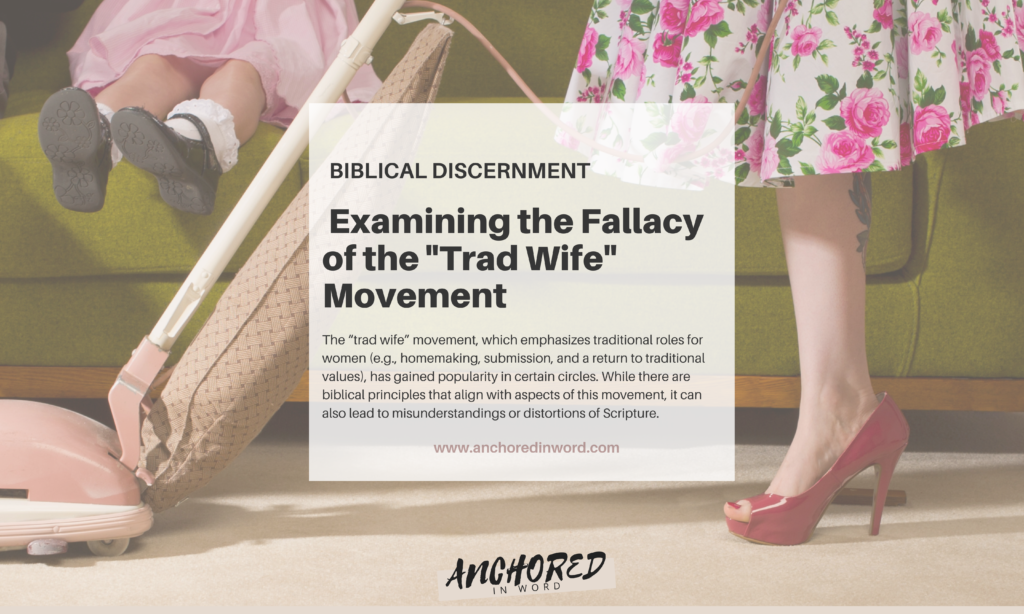
The “trad wife” movement, which emphasizes traditional roles for women (e.g., homemaking, submission, and a return to traditional values), has gained popularity in certain circles. The trad wife movement itself is has been found to be tied to Mormonism which has started with Hannah Neeleman. However, the trad wife movement encompasses a diverse group of women from various backgrounds who choose to adopt traditional domestic roles, often sharing their experiences and perspectives through online platforms. While there are biblical principles that align with aspects of this movement, it can also lead to misunderstandings or distortions of Scripture.
Table of Contents
Here are some potential biblical fallacies or misconceptions within the trad wife movement:
Overemphasis on Gender Roles as the Source of Righteousness
Fallacy: A woman’s worth or godliness is tied solely to her role as a homemaker, wife, or mother.
Biblical Response: While the Bible values roles within the family (e.g., Proverbs 31, Titus 2:4-5), our righteousness comes through faith in Christ alone, not through fulfilling societal roles.
“For it is by grace you have been saved, through faith—and this is not from yourselves, it is the gift of God—not by works, so that no one can boast.” (Ephesians 2:8-9)
Idolatry of Marriage and Motherhood
Fallacy: Elevating marriage and motherhood as the ultimate calling for women, disregarding single or childless women.
Biblical Response: Scripture affirms that singleness and marriage are both valuable callings. Paul himself celebrates singleness as an opportunity to serve the Lord fully.
“I wish that all of you were as I am. But each of you has your own gift from God; one has this gift, another has that.” (1 Corinthians 7:7)
Misapplication of Submission
Fallacy: Interpreting biblical submission to mean unquestioning obedience or a lack of personal agency for women.
Biblical Response: Submission in marriage is mutual and reflects a Christ-like relationship, where husbands are called to love sacrificially and wives respect their husbands.
“Submit to one another out of reverence for Christ.” (Ephesians 5:21)
“Husbands, love your wives, just as Christ loved the church and gave himself up for her.” (Ephesians 5:25)
Neglect of Spiritual Gifts and Callings
Fallacy: Suggesting that a woman’s role is confined to the home and that her spiritual gifts cannot be used outside of domestic life.
Biblical Response: Women in Scripture were leaders, prophets, and servants in the church (e.g., Deborah, Priscilla, Lydia). God equips all believers—men and women—for His kingdom work.
“There is neither Jew nor Gentile, neither slave nor free, nor is there male and female, for you are all one in Christ Jesus.” (Galatians 3:28)
Over-Simplification of Proverbs 31
Fallacy: Viewing Proverbs 31 solely as a mandate for traditional homemaking roles.
Biblical Response: The Proverbs 31 woman is a multifaceted example of wisdom, industry, generosity, and strength, working both within and beyond her home.
“She considers a field and buys it; out of her earnings she plants a vineyard.” (Proverbs 31:16)
Legalism and Comparison
Fallacy: Imposing specific lifestyles or roles on all women as a measure of godliness, fostering judgment or comparison.
Biblical Response: Scripture warns against legalism and reminds us that we are called to freedom in Christ.
“It is for freedom that Christ has set us free. Stand firm, then, and do not let yourselves be burdened again by a yoke of slavery.” (Galatians 5:1)
Neglect of the Great Commission
Fallacy: Prioritizing domestic life to the exclusion of evangelism and discipleship.
Biblical Response: While managing a household is important, believers are commanded to make disciples and share the Gospel.
“Therefore go and make disciples of all nations, baptizing them in the name of the Father and of the Son and of the Holy Spirit.” (Matthew 28:19)
Viewing Tradition as Equal to Scripture
Fallacy: Equating traditional values or cultural norms with biblical mandates.
Biblical Response: Scripture should always guide our lives, not cultural trends or movements. Traditions must be evaluated through the lens of God’s Word.
“See to it that no one takes you captive through hollow and deceptive philosophy, which depends on human tradition and the elemental spiritual forces of this world rather than on Christ.” (Colossians 2:8)
Missing the Bigger Picture of the Gospel
Fallacy: Focusing on external behaviors or roles instead of the heart transformation brought by the Gospel.
Biblical Response: God’s ultimate goal is to conform us to the image of Christ, regardless of our specific roles in life.
“For those God foreknew he also predestined to be conformed to the image of his Son.” (Romans 8:29)
Bible Prophecy Perspective:
While the trad wife movement promotes self-sufficiency, traditional roles, and a return to simpler living, it often fosters a mindset of relying on one’s own abilities rather than complete dependence on God. This focus on building an idealized, self-sustaining lifestyle can subtly shift our trust away from God’s provision and sovereignty, leading us to build our own kingdoms instead of seeking His.
In Bible prophecy, the Great Tribulation serves as a sobering reminder that all earthly systems, no matter how carefully constructed, will ultimately fail. The shaking of the world during this time will reveal that true sufficiency lies not in our own efforts, but in God alone. “For the mountains may depart and the hills be removed, but my steadfast love shall not depart from you, and my covenant of peace shall not be removed,” says the Lord, who has compassion on you. (Isaiah 54:10)
While it’s wise to be resourceful and prepared, Scripture warns us against placing our confidence in the works of our own hands. “Unless the Lord builds the house, the builders labor in vain.” (Psalm 127:1). The pursuit of self-sufficiency through movements like this can lead us to rely on our own strength, forgetting that God alone is our refuge and provider, even in the most desperate times.
The tribulation will expose the futility of human efforts to build secure lives apart from God. It will be a time when only those who place their full trust in Him will endure. “Therefore let us be grateful for receiving a kingdom that cannot be shaken, and thus let us offer to God acceptable worship, with reverence and awe.” (Hebrews 12:28). While building a stable home and family is admirable, our ultimate hope and sufficiency must always rest in Christ and His unshakable kingdom—not in self-made systems.
The trad wife movement, though rooted in noble values, can unintentionally point people toward creating their own version of security in this world rather than anchoring their lives in God’s eternal provision. As believers, we are called to prepare for Christ’s return, not just by stewarding our resources, but by cultivating a dependence on Him that transcends anything this world can offer. Let the tribulation remind us that God alone is sufficient, and His kingdom is the only foundation that will stand forever.
“The Lord is my strength and my shield; in Him my heart trusts, and I am helped.” (Psalm 28:7)
My Response To The Trad Wife Movement:
I want to extend grace to those embracing the trad wife movement, as many are likely motivated by a genuine desire to honor God, care for their families, and live out their convictions. My intent is not to condemn but to encourage thoughtful reflection. As Christians, we are called to test all things and hold fast to what is good (1 Thessalonians 5:21). Movements embraced by the majority—even those that seem wholesome—should be measured against Scripture, not merely cultural or personal ideals. It’s not about assuming evil but ensuring our lives, choices, and even the trends we follow align with God’s Word above all else. My hope is to promote discernment and faithfulness in all we do.
While aspects of the trad wife movement align with biblical principles, it’s essential to avoid reducing biblical womanhood to a cultural ideal. Scripture calls women to pursue Christ above all else, using their unique gifts and roles to glorify God and advance His kingdom. Holiness is not about conforming to a lifestyle but about living in obedience to God’s Word.
Be blessed and go in Peace,
Anda
